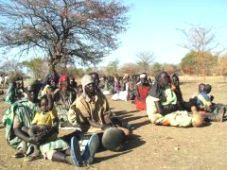US sees little progress on Darfur, Libya rights
WASHINGTON, March 28 (Reuters) – The United States acknowledged on Monday that it has failed to end the genocide in Darfur or resolve two major rights cases in Libya as it issued a report on its efforts to promote human rights abroad.

|
|
Displaced Sudanese women from the Darfur region wait for relief food southeast of Khartoum, February 19, 2005. (Reuters). |
The annual State Department report, “Supporting Human Rights and Democracy,” is a companion to its country-by-country human rights assessments released on Feb. 28.
The reports have angered many foreign countries, which accuse the United States of ignoring its own abuses while highlighting those of others.
Presenting the report, Acting Assistant Secretary of State Michael Kozak said Washington was trying to maintain humanitarian access to Darfur, to raise the number of African Union forces there to deter violence and to pressure the Sudanese government to stop it.
“(It) hasn’t worked yet but that’s the line of approach that we’re trying,” Kozak said, adding that Sudanese officials keep “bobbing and weaving” despite the pressure.
“That is one of the most acute human rights problems in the world right now,” he said.
Tens of thousands have died over the past two years in the Darfur region of western Sudan where armed Arab militias known as Janjaweed have been accused of conducting a widespread campaign of raping, killing and looting. The State Department has described the campaign as genocide.
Kozak also said the United States had not seen any “forward movement” from Libya on Fathi al-Jahmi, a Libyan man imprisoned last year after advocating free speech and democracy, or on five Bulgarian nurses and a Palestinian doctor sentenced to death for allegedly infecting children with the AIDS virus.
Human rights groups say the United States’ moral authority has been eroded by detaining people without trial at Guantanamo Bay, Cuba, abuses of prisoners by U.S. troops at Iraq’s Abu Ghraib prison and the practice of “rendition” — or sending suspects to countries where they may be tortured.
“U.S. authority to promote human rights abroad diminishes every time it sanctions rendition, refuses to thoroughly investigate detainee abuse, denies its citizens access to an attorney or habeas corpus, or approves small arms shipments to countries with abysmal human rights records,” Amnesty International USA said in a statement.
